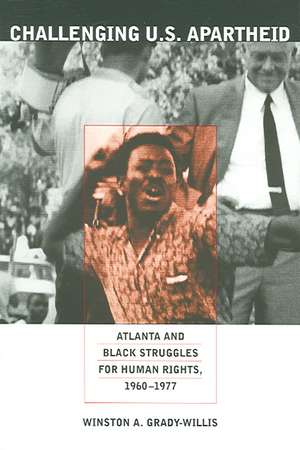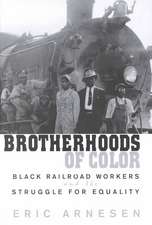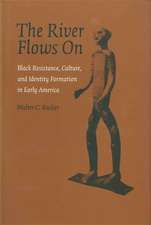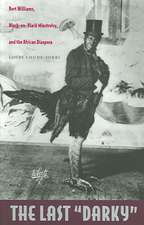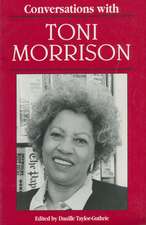Challenging U.S. Apartheid – Atlanta and Black Struggles for Human Rights, 1960–1977
Autor Winston A. Grady–willisen Limba Engleză Paperback – 4 iul 2006
Preț: 216.43 lei
Nou
Puncte Express: 325
Preț estimativ în valută:
41.42€ • 43.13$ • 35.01£
41.42€ • 43.13$ • 35.01£
Carte disponibilă
Livrare economică 15 februarie-01 martie
Livrare express 01-07 februarie pentru 29.93 lei
Preluare comenzi: 021 569.72.76
Specificații
ISBN-13: 9780822337911
ISBN-10: 0822337916
Pagini: 312
Ilustrații: 11 photographs, 1 map
Dimensiuni: 155 x 234 x 27 mm
Greutate: 0.45 kg
Editura: MD – Duke University Press
Locul publicării:United States
ISBN-10: 0822337916
Pagini: 312
Ilustrații: 11 photographs, 1 map
Dimensiuni: 155 x 234 x 27 mm
Greutate: 0.45 kg
Editura: MD – Duke University Press
Locul publicării:United States
Recenzii
"Through an examination of black women engaged in both property and violent crime in the context of political, social, and economic disfranchisement, Kali N. Gross has produced a riveting narrative that reveals the ways in which criminal acts and courtroom and prison behavior were also expressive acts. She not only contributes profoundly to our understanding of black working-class and poor women in and around turn-of-the century Philadelphia, but she resists the tendency to romanticize these women as primitive rebels. The work is truly pathbreaking. Robin D. G. Kelley, author of Freedom Dreams: The Black Radical Imagination
""Challenging U.S. Apartheid is a brilliant and provocative contribution to our understanding of the Black freedom movement in Atlanta in the 1960s and 1970s. While Martin Luther King Jr.s legacy has long dominated our understanding of the movement in Atlanta, Winston A. Grady-Willis forces us to look again with a wider lens and a new set of sensibilities. With insight and eloquence he demonstrates the pivotal role of women and Atlantas Black working class in the fight for racial and economic justice and self-determination. He does not simply give a polite nod to issues of gender and class. Rather, these modes of analysis take center stage in his thinking and in his work. Grady-Willis has done for Atlanta what Charles Payne and John Dittmer did for Mississippi. This book is a must-read for anyone serious about understanding the landmark social justice struggles of the 1960s and 1970s.--Barbara Ransby, author of Ella Baker and the Black Freedom Movement: A Radical Democratic Vision"By deploying the frames of apartheid and human rights to analyze social struggle in the Black U.S. urban context, Winston A. Grady-Williss work asks scholars to rethink the way we characterize Black demands and, therefore, their relationship to a broader activist cadre and global politics.--Rhonda Y. Williams, author of The Politics of Public Housing: Black Womens Struggles Against Urban Inequality
"Through an examination of black women engaged in both property and violent crime in the context of political, social, and economic disfranchisement, Kali N. Gross has produced a riveting narrative that reveals the ways in which criminal acts and courtroom and prison behavior were also expressive acts. She not only contributes profoundly to our understanding of black working-class and poor women in and around turn-of-the century Philadelphia, but she resists the tendency to romanticize these women as 'primitive rebels.' The work is truly pathbreaking." Robin D. G. Kelley, author of Freedom Dreams: The Black Radical Imagination " "Challenging U.S. Apartheid is a brilliant and provocative contribution to our understanding of the Black freedom movement in Atlanta in the 1960s and 1970s. While Martin Luther King Jr.'s legacy has long dominated our understanding of the movement in Atlanta, Winston A. Grady-Willis forces us to look again with a wider lens and a new set of sensibilities. With insight and eloquence he demonstrates the pivotal role of women and Atlanta's Black working class in the fight for racial and economic justice and self-determination. He does not simply give a polite nod to issues of gender and class. Rather, these modes of analysis take center stage in his thinking and in his work. Grady-Willis has done for Atlanta what Charles Payne and John Dittmer did for Mississippi. This book is a must-read for anyone serious about understanding the landmark social justice struggles of the 1960s and 1970s."--Barbara Ransby, author of Ella Baker and the Black Freedom Movement: A Radical Democratic Vision "By deploying the frames of apartheid and human rights to analyze social struggle in the Black U.S. urban context, Winston A. Grady-Willis's work asks scholars to rethink the way we characterize Black demands and, therefore, their relationship to a broader activist cadre and global politics."--Rhonda Y. Williams, author of The Politics of Public Housing: Black Women's Struggles Against Urban Inequality
""Challenging U.S. Apartheid is a brilliant and provocative contribution to our understanding of the Black freedom movement in Atlanta in the 1960s and 1970s. While Martin Luther King Jr.s legacy has long dominated our understanding of the movement in Atlanta, Winston A. Grady-Willis forces us to look again with a wider lens and a new set of sensibilities. With insight and eloquence he demonstrates the pivotal role of women and Atlantas Black working class in the fight for racial and economic justice and self-determination. He does not simply give a polite nod to issues of gender and class. Rather, these modes of analysis take center stage in his thinking and in his work. Grady-Willis has done for Atlanta what Charles Payne and John Dittmer did for Mississippi. This book is a must-read for anyone serious about understanding the landmark social justice struggles of the 1960s and 1970s.--Barbara Ransby, author of Ella Baker and the Black Freedom Movement: A Radical Democratic Vision"By deploying the frames of apartheid and human rights to analyze social struggle in the Black U.S. urban context, Winston A. Grady-Williss work asks scholars to rethink the way we characterize Black demands and, therefore, their relationship to a broader activist cadre and global politics.--Rhonda Y. Williams, author of The Politics of Public Housing: Black Womens Struggles Against Urban Inequality
"Through an examination of black women engaged in both property and violent crime in the context of political, social, and economic disfranchisement, Kali N. Gross has produced a riveting narrative that reveals the ways in which criminal acts and courtroom and prison behavior were also expressive acts. She not only contributes profoundly to our understanding of black working-class and poor women in and around turn-of-the century Philadelphia, but she resists the tendency to romanticize these women as 'primitive rebels.' The work is truly pathbreaking." Robin D. G. Kelley, author of Freedom Dreams: The Black Radical Imagination " "Challenging U.S. Apartheid is a brilliant and provocative contribution to our understanding of the Black freedom movement in Atlanta in the 1960s and 1970s. While Martin Luther King Jr.'s legacy has long dominated our understanding of the movement in Atlanta, Winston A. Grady-Willis forces us to look again with a wider lens and a new set of sensibilities. With insight and eloquence he demonstrates the pivotal role of women and Atlanta's Black working class in the fight for racial and economic justice and self-determination. He does not simply give a polite nod to issues of gender and class. Rather, these modes of analysis take center stage in his thinking and in his work. Grady-Willis has done for Atlanta what Charles Payne and John Dittmer did for Mississippi. This book is a must-read for anyone serious about understanding the landmark social justice struggles of the 1960s and 1970s."--Barbara Ransby, author of Ella Baker and the Black Freedom Movement: A Radical Democratic Vision "By deploying the frames of apartheid and human rights to analyze social struggle in the Black U.S. urban context, Winston A. Grady-Willis's work asks scholars to rethink the way we characterize Black demands and, therefore, their relationship to a broader activist cadre and global politics."--Rhonda Y. Williams, author of The Politics of Public Housing: Black Women's Struggles Against Urban Inequality
Notă biografică
Winston A. Grady-Willis is Associate Professor of African American Studies at Syracuse University.
Textul de pe ultima copertă
"By deploying the frames of apartheid and human rights to analyze social struggle in the Black U.S. urban context, Winston A. Grady-Willis's work asks scholars to rethink the way we characterize Black demands and, therefore, their relationship to a broader activist cadre and global politics."--Rhonda Y. Williams, author of "The Politics of Public Housing: Black Women's Struggles Against Urban Inequality"
Cuprins
Acknowledgements ix
Prologue xiii
Abbreviations xxiii
PART I: NONVIOLENT DIRECT ACTION
1. The Committee on Appeal for Human Rights and Phase One of the Direct Action Campaign 3
2. Phase Two of the Direct Action Campaign and the Fall of Petty Apartheid in Atlanta 33
PART II: DEMANDING BLACK POWER
3. Bridges 59
4. The Atlanta Project of the Student Nonviolent Coordinating Committee 79
5. Neighborhood Protest and the Voices of the Black Working Poor 114
PART III: THE QUEST FOR SELF-DETERMINATION
6. Black Studies and the Birth of the Institute of the Black World 143
7. The Multi-front Black Struggle for Human Rights 169
Epilogue 206
Notes 213
Bibliography 265
Indez 281
Prologue xiii
Abbreviations xxiii
PART I: NONVIOLENT DIRECT ACTION
1. The Committee on Appeal for Human Rights and Phase One of the Direct Action Campaign 3
2. Phase Two of the Direct Action Campaign and the Fall of Petty Apartheid in Atlanta 33
PART II: DEMANDING BLACK POWER
3. Bridges 59
4. The Atlanta Project of the Student Nonviolent Coordinating Committee 79
5. Neighborhood Protest and the Voices of the Black Working Poor 114
PART III: THE QUEST FOR SELF-DETERMINATION
6. Black Studies and the Birth of the Institute of the Black World 143
7. The Multi-front Black Struggle for Human Rights 169
Epilogue 206
Notes 213
Bibliography 265
Indez 281
Descriere
A history of Black struggles for human rights in Atlanta, Georgia, from the student non-violent direct action movement through Black Power and the reemergence of Black woman-centered activism.
